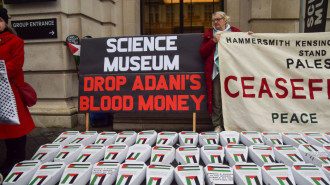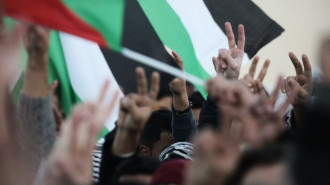
Adrift in stormy weather Idlib's displaced search for shelter once more

For displaced Syrians in northern Idlib, the suffering is far from over once they have found shelter in the camps which dot the northern province, having fled the Syrian regime's bombardment of their villages further to the south.
While the regime and its Russian ally have seized control of their former lands, possessions, and means to a living, the displaced continue to be plagued by the fear of repeated displacement as they come up against further expulsions from the sites in which they are allowed only temporary respite.
This time they are being driven out by the landowners who own the fields where they have erected their tents, staunchly supported by Hayat Tahrir al-Sham's (HTS) security services.
"This time they are being driven out by the landowners who own the fields where they have erected their tents, staunchly supported by Hayat Tahrir al-Sham's (HTS) security services"
HTS sides with landowners against Idlib's displaced
Despite HTS being largely in control of the region, they have made no attempt to find solutions to the plight of internally displaced Syrians (IDPs) and actively take part in the expulsions, leaving the displaced on the road once again in their stricken homeland.
Hayam Badrawi was forced to flee Ma'ar Shimmareen village, settling in the Khalil camp (part of the Atmeh camp cluster in north Idlib). She says the owner of the land demanded they leave, refusing to allow them to stay even until the end of winter, which would have given them some time to find an alternative site.
She adds that the landowner refused to consider any suggestions by camp residents that would have allowed them to stay, and sought HTS support in kicking them out. HTS obliged, arresting dozens of young men from the camp and holding them hostage, to force the residents to leave and relinquish the site to the owner.
|
|
"How long will we have nothing, fleeing war with nowhere to go? How many times will we be forced to leave with our children, moving our baggage from place to place? Can’t we settle even if just for a short time?"
A never-ending search for shelter
She described the camps in north Idlib as "an exile, where life's basic necessities are missing – the tents are falling apart, there are no services, no healthcare, no education." Despite these abject conditions, they are still forced to leave and begin the arduous search for safety once more, knowing that once they do, the same threat will hang over them.
Syrians forced to vacate the camps have sought help from the Salvation Government's Ministry of Development, the administrative arm of HTS. However, their pleas have fallen on deaf ears.
"Displaced Syrians are being mercilessly exploited by locals in the areas they end up in. This is sometimes done through extortionate rates being charged for them to rent or buy property, or to secure temporary 'tenancy' on the lands where they set up their camps"
Ayman Aboud (45), who lives in Atfalna Tunashidukum camp (another Atmeh camp) was also ordered to leave. He says the landowner demanded the residents pay a large sum if they wanted to rent his land for another year and if they couldn't pay they would have to vacate the camp with their families, despite the freezing winter conditions.
Empty words and the exploitation of the vulnerable
Aboud says displaced Syrians are being mercilessly exploited by locals in the areas they end up in. This is sometimes done through extortionate rates being charged for them to rent or buy property, or to secure temporary 'tenancy' on the lands where they set up their camps.
He criticizes the de-facto government which has not bothered to try to find solutions for the displaced, abandoning them to exploitative practices and repeated displacement.
"Jolani and his salvation government officials often appear in the media talking about how they stand with civilians and the displaced, how they sympathise with their plight and care about them. However, in reality, we see the opposite: they make our troubles worse with full intent by raising prices, increasing taxes and fighting all our attempts to access any way of making a living.
"We saw no concern from them when storms swept away hundreds of tents, nor when children froze to death. Likewise, we see no concern at the exploitation of the displaced even as they are mired in the most abject poverty, costs are rising, and there is no work."
Raida Zaki (30) can’t hide her tears whilst expressing her despair at being forced to leave once more in search of a new shelter as she questions: "Where are we supposed to go?"
"We are on our own facing tyranny from all sides. It is as though what we are suffering no longer matters to anyone… whether we die, live, become homeless or starve"
With three young children and a husband who suffers from chronic illness, she doesn't know how they will cope: "How can we manage on our own? We have no options." She fears the effect moving in the wet and stormy weather will have on her children, especially since they suffer frequently from chest complaints and acute bronchitis – a result of camp heater fumes and the bitter cold.
Sixty-something Marwa Ramos meanwhile complains about the arrest of her three sons and their families by HTS after they were summoned by their security services when the landowner filed a lawsuit against the camp residents.
She says: "We are on our own facing tyranny from all sides. It is as though what we are suffering no longer matters to anyone… whether we die, live, become homeless or starve."
After the Assad regime's military operations in southern Idlib and the northern countryside of Hama in late 2018, civilians who fled dreamt of finding a safe haven where they could shelter until the fighting stopped.
For this reason, most chose to settle on agricultural land near city and town centres in north Idlib so they could easily access medical services and markets, rather than more distant mountainous regions from which accessing basic services would have been impossible.
Generally, the families who set up their tents on those lands had to make agreements with the landowners to erect their tents there in return for an annual sum, reportedly around $300. However, more recently, landowners have exploited camp residents' need to extend their stay – vastly increasing the rent for using the land, which has left impoverished families unable to pay and effectively forced them out.
Olive pickers are risking death to work the fields of Idlib's Jabal Al-Zawiya region in Syria, an area under constant bombardment from the Assad regime.
— The New Arab (@The_NewArab) November 12, 2021
We meet some of the labourers to understand what's driving their desperation for work: https://t.co/sphSeiaRqz
Some of the most vulnerable live in these camps, to which many families have been displaced from all over Syria, including the elderly, widows, orphans, and the disabled. The suffering of the most vulnerable during recurring displacement, especially during the freezing winter months, has been ignored by the region's officials. A slow exodus is underway, as families trickle one by one to various areas of northern Syria.
Alia Al-Salloum (32) was left alone to care for her three children when her husband was killed when their village, al-Bara, was bombed. They fled the town and settled for three years in Atfalna Tunashidukum camp.
"Overnight, I found myself compelled to flee again without warning…I had to take my belongings and moved to another camp with my children," she says.
Alia is saddened by the loss of neighbours they had grown close to in the camp and is distressed at having to uproot her children again. The loss of their friends in the camp has affected them deeply and they have become fearful and withdrawn.
"Landowners have exploited camp residents' need to extend their stay – vastly increasing the rent for using the land, which has left impoverished families unable to pay"
While Alia sits, patching up her weather-battered tent, she states: "A life spent in tents is harsh. But harsher still is when you find yourself on the road with your children again and again on a miserable journey which never ends."
Limited assistance and long-term repercussions
For his part, Ahmed Al Taleb, director of the Al Yamama Volunteer Team (which provides aid and assistance to the displaced in northern Syria), explains that as a civil society volunteer team, what they can do is sadly limited in cases where displaced people are expelled from camps.
In these cases, Al Yamama will try to arrange transport for them. They also replace damaged tents with new ones and set up toilets and showers, laundries, and secure garbage containers in the camps. He stressed that they are not in a position that allows them to negotiate with the landowner to allow the camps to remain or press the current authorities to find solutions.
|
|
Taleb warned of the ramifications of forcibly displacing those in the camps, whose circumstances are already dire. There is a heavy mental and physical toll on those affected which manifests in fear, anxiety and psychological disorders caused by instability and insecurity. Colds, as well as chest and skin infections, are rampant due to homelessness, the lack of medical care and provisions for basic hygiene.
According to the latest statistics from the Response Coordination Group in northern Syria, the number of displaced Syrians today numbers around 2.1 million, out of more than 4 million Syrians residing in the Syrian opposition-held areas.
The population of the camps in the region is 1,043,869, currently residing in 1,293 camps, of which 282 are unofficial camps set up on agricultural lands which don’t receive international support or humanitarian assistance of any kind.
Hadia Al Mansour is a freelance journalist from Syria who has written for Asharq Al-Awsat, Al-Monitor, SyriaUntold and Rising for Freedom Magazine.
Article translated from Arabic by Rose Chacko





